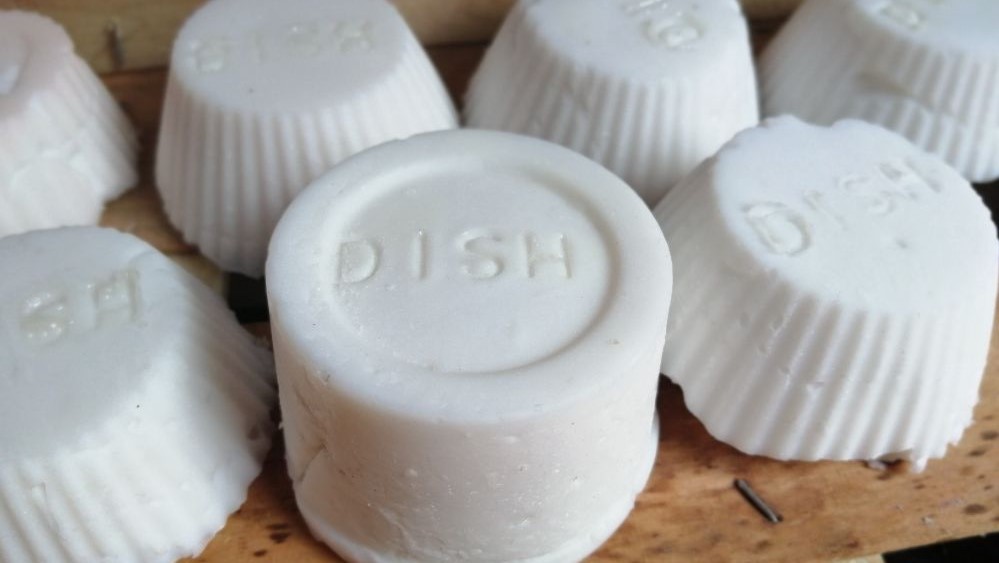Green housing : Make your own household soap
This zero-waste household soap is the perfect, plastic free way to get your plates, dishes and pans squeaky clean. It will also be very efficient to clean all surface in the kitchen or bathroom. And as well, good to know, it is ideal to remove stains from clothe before washing machine (blood, tomato sauce, grease…)
There are many eco-friendly products we can use for hand dish washing. This one is my favourite because it can also be multi-purpose. The product which is going to be introduced here is made from the traditional cold process. That means we just have to mix together oil and Sodium Hydroxyde. From a chemical reaction between fat and NaOH will result soap (and glycerin). In this formumation, the best oil to use is the coconut oil. Afer the chemical reaction you will get very detergent properties for your soap, which we reserve for household use only, it is not meant to be used to clean your skin. Coconut oil is also very rich in stearic acid, which will give a very hard soap (good properties to extend your soap lifepan) and lauric acid, which gives the soap incredible foaming, washing and hardening properties. Coconut oil will give a stripping and degreasing side to the soap. This all-coconut soap is not suitable for fragile skin, use it preferably with gloves. To wash your body, you will use superfat soap, that means in the formulation of a body soap bar we are going to put more oil than needed by the reaction with Sodium Hydroxid to get it extra fat. That’s how all my body soaps are !
To clean the dishes, as we don’t need to let a protective and hydratating film on your dish, we are going to measure exactly the precised quantity of Oil and Sodium hydroxide and water. And only add 3% extra fat.
The only alternative oil which has the same cleansing properties is the Babassu oil, which come from very far as well. Thinking about origins and carbon impact is always a hard balance to find. You will have no plastic waste at home but the oil you are using come from far.

Precautions
Caustic soda is corrosive and can burn your skin if in contact. The best protection is to have long leaves, long trousers, glasses, gloves and apron. Caustic soda is made from sodium chloride (i.e. the salt we have in the kitchen).
All the tools used in a recipe involving caustic soda must not go back to the kitchen. When handling caustic soda, be careful to have kids and pets far from your doing.
Only three ingredients to make your household soap
Before making a recipe that involves caustic soda, you must check the safety of Caustic soda quantity used. Lots of soap calculators are available on line.
For this recipe, I have used this formulation :
* 100 g of coconut oil
* 37,2 g of water
* 17,751 g of caustic soda (this quantity offer a 3% surfat to avoid dry skin)
The easy recipe
Heat the coconut oil if still solid (coconut oil becomes liquid from 25°C)
Make the lye by gently pouring caustic soda in water while mixing gently. It is going to become very hot, let it cool down.
When temeprature reach room temperature, in a small bowl, pour the coconut oil (melt), then pour gently the lye . Mix and blend to accelerate reaction. when it becomes a bit solid, add a 10 drops of an antibacterial essential oil if you like the smell. (tea tree, grape fruit, eucalyptus, oregano, citronella, mint, lemon). Essantial oil are optional. As it is very complex and expensive to produce, we must always consider their use in our making. Essantial oil are used for their medicinal properties.
Afet 5 hours, stamp the soap (dish soap for example) to remember what it is.
Let it dry for 2 weeks.
How to use it
Only a small amount is needed for this concentrated dish soap, just wet your cloth, sponge or brush and rub the soap and then wash your dishes, your surfaces as normal. Rinse thoroughly.
Keep your soap dry between use to extend its life.
Conservation of your household soap
You can either store or use it after 2 weeks of drying. It won’t really expire.